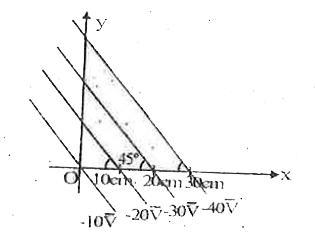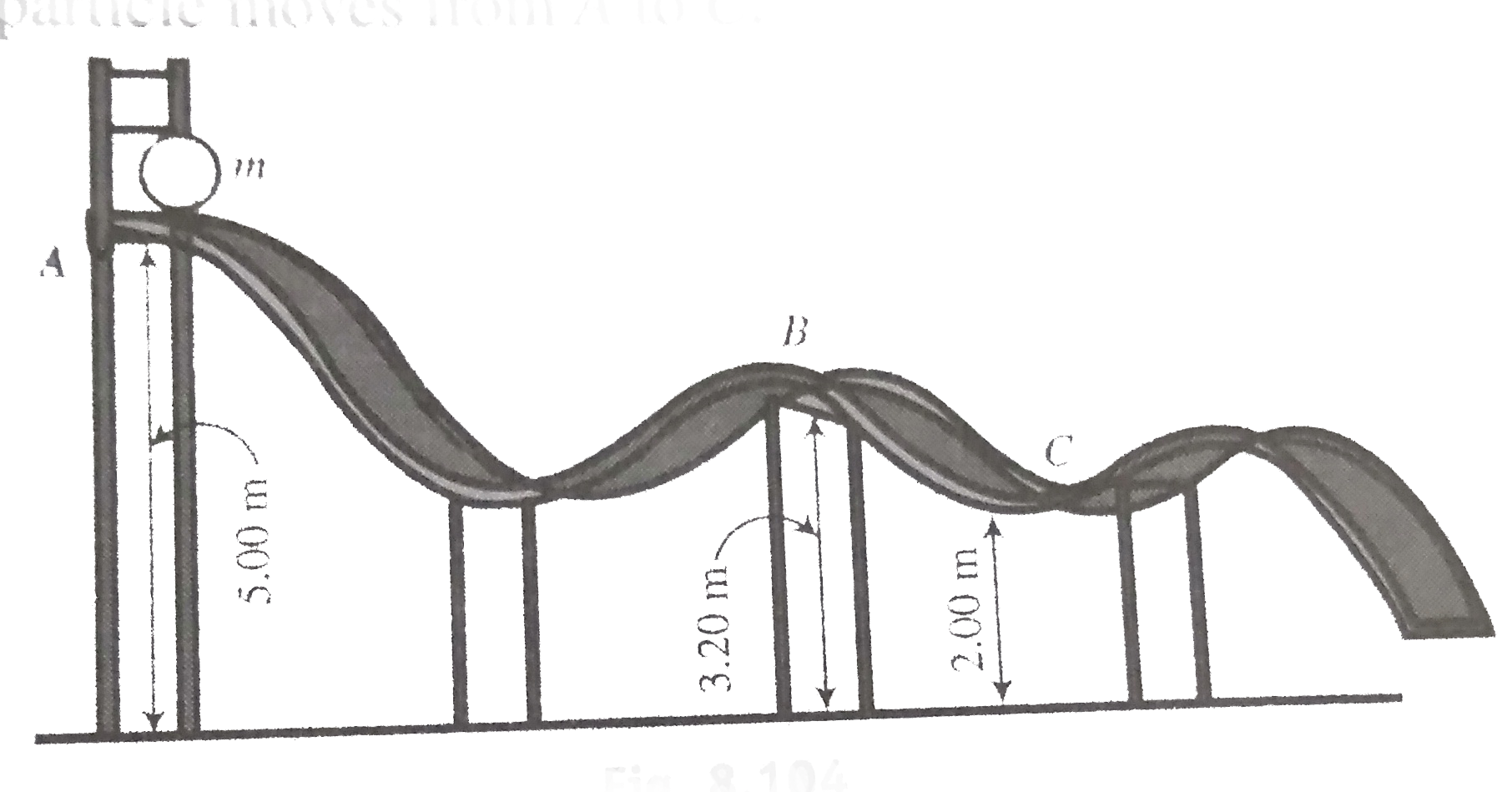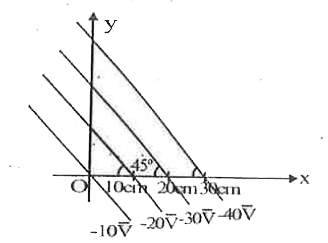A particle of mass 1 kg is released from rest at a point where gravitational potential is 5 J/kg. After some time, it passes through a point B with a speed of 1 m/s. What is the gravitational potential at B ?
To solve the problem, we will use the principle of conservation of mechanical energy, which states that the total mechanical energy (kinetic energy + potential energy) in a system remains constant if only conservative forces (like gravity) are acting on it.
1. Identify the given data:
- Mass of the particle, m=1kg
- Initial gravitational potential at point A, VA=5J/kg
- Speed at point B, vB=1m/s
2. Calculate the initial potential energy at point A:
PEA=m⋅VA=1kg⋅5J/kg=5J
3. Calculate the kinetic energy at point B:
KEB=12mv2B=12⋅1kg⋅(1m/s)2=12⋅1⋅1=0.5J
4. Apply the conservation of energy principle:
The total mechanical energy at point A is equal to the total mechanical energy at point B:
PEA+KEA=PEB+KEB
Since the particle is released from rest, KEA=0:
5J+0=PEB+0.5J
5. Rearranging the equation to find the potential energy at point B:
PEB=5J−0.5J=4.5J
6. Calculate the gravitational potential at point B:
Since gravitational potential VB is defined as the potential energy per unit mass:
VB=PEBm=4.5J1kg=4.5J/kg
Final Answer:
The gravitational potential at point B is VB=4.5J/kg.
---
- Mass of the particle, m=1kg
- Initial gravitational potential at point A, VA=5J/kg
- Speed at point B, vB=1m/s
PEA=m⋅VA=1kg⋅5J/kg=5J
KEB=12mv2B=12⋅1kg⋅(1m/s)2=12⋅1⋅1=0.5J
The total mechanical energy at point A is equal to the total mechanical energy at point B:
PEA+KEA=PEB+KEB
Since the particle is released from rest, KEA=0:
5J+0=PEB+0.5J
PEB=5J−0.5J=4.5J
Since gravitational potential VB is defined as the potential energy per unit mass:
VB=PEBm=4.5J1kg=4.5J/kg
The gravitational potential at point B is VB=4.5J/kg.
Topper's Solved these Questions
- GRAVITATION Book:AAKASH INSTITUTE ENGLISHChapter:GRAVITATION Exercise:Try Yourself
Explore 33 Videos
- GRAVITATION Book:AAKASH INSTITUTE ENGLISHChapter:GRAVITATION Exercise:ASSIGNMENT SECTION -A (Objective Type Questions (one option is correct))
Explore 50 Videos
- ELECTROSTATIC POTENTIAL AND CAPACITANCE Book:AAKASH INSTITUTE ENGLISHChapter:ELECTROSTATIC POTENTIAL AND CAPACITANCE Exercise:ASSIGNMENT SECTION - D
Explore 9 Videos
- KINETIC THEORYBook:AAKASH INSTITUTE ENGLISHChapter:KINETIC THEORYExercise:EXERCISE (ASSIGNMENT) SECTION - D Assertion - Reason Type Questions
Explore 10 Videos
Similar Questions
A particle of mass m and positive charge q is released from point A. Its speed is found to be v when it passes through a point B. which of the two points is at higher potential ? What is the potential difference between the points?
View SolutionTwo small bodies of masses 2.00 kg and 4.00 kg are kept at rest at a separation of 2.0 m. Where should a particle of mass 0.10 kg be placed to experience no net gravitational force from these bodies? The particle is placed at this point. What is the gravitational potential energy of the system of three particle with usual reference level?
View Solution
Knowledge Check
The gravitational field intensity at a point 10,000km from the centre of the earth is 4.8Nkg−1. The gravitational potential at that point is
A−4.8×107Jkg−1B−2.4×107Jkg−1C4.8×106Jkg−1D3.6×106Jkg−1
A boy has a mass of 55 kg. He climbs 10 m up a tree. What is his gravitational potential energy?
View SolutionThe gravitational field strength →E and gravitational potential V are releated as
→E=−(δVδxˆi+δVδyˆj+δVδzˆk)

In the figure, transversal lines represent equipotential surfaces. A particle of mass m is released from rest at the origin. The gravitational unit of potential , 1→V=1cm2/s2
Speed of the particle (v) (y is in cm and v in cm/s) as function of its y-co-ordinate is
View SolutionA 5kg mass is accelerated from rest to 60 m/s in 1 sec. what force acts on it:
View SolutionThe gravitational potential due to earth at infinite distance from it is zero. Let the gravitational potential at a point P be −5Jkg−1. Suppose, we arbitrarily assume the gravitational potential at infinity to be +10Jkg−1, then the gravitational potential at P will be
View SolutionA particle of mass m=5.00kg is released from point A and it slides on the frictionless track shown in figure. Determine (a) the particle's speed at points B and C and (b) the net work done by the gravitational force as the particle moves from A to C.

View SolutionThe gravitational field strength →E and gravitational potential V are releated as
→E=−(δVδxˆi+δVδyˆj+δVδzhark)

In the figure, transversal lines represent equipotential surfaces. A particle of mass m is released from rest at the origin. The gravitational unit of potential , 1→V=1cm2/s2
Speed of the particle (v) (y is in cm and v is in cm//s) as function of its y-co ordinate is
View SolutionA particle of mass M is placed at the centre of a uniform spherical shell of equal mass and radius a. Find the gravitational potential at a point P at a distance a2 from the centre.
View Solution